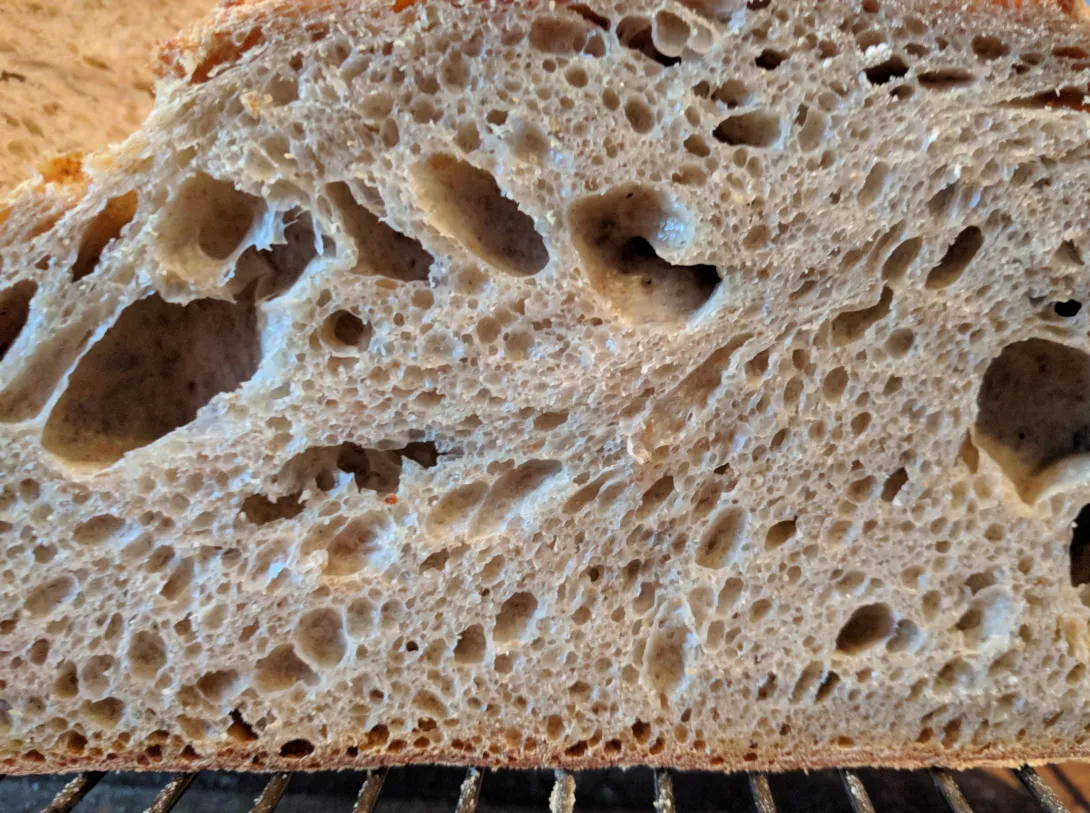Hi all,
I am a long time lurker here but infrequent poster. Love all the great info and inspiration so thought it was time to chip in.
I began my first starter in March and have been doing pretty much weekly bakes since with a few successes (mostly luck to begin with) and many, ahem, lessons. Recently I have felt more in control of each step of the process and late last night I took this badboy out the oven:

Recipe:
520g Wessex Mill strong white bread flour
60g rye wholemeal flour
30g spelt flour
415g water
13g salt
120g mature 100% levain (50/50 white/rye)
Hydration: 71%
I've been let down by my flour when trying standard autolyses so have knocked them on the head. Instead I mixed all the ingredients roughly and left alone.
After an hour, I mixed initially with the Rubaud method and then ten minutes of slap and folds until I could feel the strength in the dough and it was leaving the work top clean after each slap and fold.
A vigorous stretch and fold every ten minutes for an hour and then into the fridge overnight.
After 24(ish) hours, I turned the dough onto the worktop and gave a pre-shape and left to bench rest.
After an hour I shaped by stretching and bringing each of the sides nearly all the way back across the dough and patting lightly. Finished with some light cloaking to make a tight boule.
Into the floured banneton in the oven with the light on.
After three hours it was looking crazy lively and the push test had it nearly returning to fill out the dimples.
Turned on to the cloche (pre-heated at 240c), lid on and into the oven.
Lid off at 25 minutes and excited to see the best oven spring I have gotten to date.
Heat down to 200c for another 30 minutes, then heat off but left in the oven with the door cracked for another 10.
Came down this morning to check the business:


The crumb is a little denser than I wanted - is that underproving, or just an outcome of the retarded bulk?
Anyway, really happy to feel like I have finally "consciously" pretty much achieved the loaf I wanted and looking forward to pushing on.
Cheers,
Ned
*Edited for clarity / spleling*
Look at that crumb! Looks great. Awesome ears as well.
it's classic amd great loaf too :)
That looks awesome. I’m a few months newer than you (baked my second loaf last weekend) and have yet to achieve that amazing oven spring. Yours looks like a success on that front. Crumb looks good to me but maybe more experienced bakers will have some suggestions.
Beautiful crumb! Beautiful.
Nice to see your first contribution and a very nice result, you haven't posted any of your details about yourself under view button, but i am presuming you are in the UK from the Wessex Mill Flour that you used and the pint being enjoyed in your Avatar. i recently enjoyed both whilst on holiday back to the old country. The Wessex mil was particularly nice to use. Keep up the good work and keep posting Kind regards Derek (aus)
I didn't even spot the place to update info (now done), but yes, I'm in the UK. The Wessex Mill flour isn't the strongest I've found but it does have a lovely flavour. Their Malted 'Dobber' is particularly delicious, but it's in and out of stock at my local unfortunately.
Well done that man, definitely helps when we can see where people are located all around this great big world of ours. You can often find someone in your own neck of the woods too and get togethers can be very rewarding. i visited an Uncle and Aunt in Pershore a few months ago.
The Dobbler sounds very interesting, wish i had seen that when i was staying in Huddersfield where i managed to get the Wessex Mill flour. Look forward to seeing more of your loaves., You might like to post in the blog section as it keeps all your entries together.
Kind regards Derek
Hi all and thanks for the lovely comments. Definitely the best one I've made all round. Now I've got a method that appears to be working, I'm going to play around with some different flours, grains and hydration. I expect it'll be two steps back at first, but it all gets eaten, hey?
Your comments on autolyse are interesting and I suspect I concur! I'm not quite sure what you mean by "standard autolyse". The original autolyse developed by Prof. Calvel was for 30 mins. Some bakers have now pushed the envelope and are specifying times of 12 hours or more.
My personal findings are that 30 mins are fine but anything over an hour does no good and in fact is likely to make your bake worse because of the enzymatic degradation of the flour.
Some then go on to specify that the long autolyse should be done in the fridge to avoid this. We then have a situation that the dough has been put in the fridge overnight and we then have to somehow get the temperature up from 4C to 24C before we can use it.
So long autolyses are not for me. I have tried them and will never use them again. I find 15 mins plus another 15 mins with the levain works fine for me. I develop gluten with a mixer, so I am not interested in any reduction in gluten development time that a long autolyse may possibly bring.
Lance
By "standard autolyse" I mean just flour and water mixed, no salt or levain. I felt I was struggling to get any real strength into my dough if I did anything from 45mins upwards and so thought "What's the point?". Now I just roughly mix everything, leave it an hour, and I've already got some lovely gluten development that I can coax further with whatever method is appropriate for the dough.
I'll take Trevor Wilson's advice that fermentation and handling are 80% of the game here, and I'll work my hardest at nailing those before I need to worry too much about autolyse or anything else.
Hi, I have always wondered why we cannot add salt during autolyse. Thoughts?
I'm no expert but from what I've read, I believe it inhibits the process that aids extensibility of the dough, so, all other things being equal, a one hour "true" autolyse would gain more extensibility in a dough than a one hour autolyse/rest including salt. I'm happy/ready to be corrected on that.